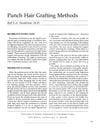2 citations,
December 2021 in “Pharmaceutics” Finasteride-loaded proniosomes effectively promote hair growth in mice.
 25 citations,
November 2008 in “Ophthalmic Plastic and Reconstructive Surgery”
25 citations,
November 2008 in “Ophthalmic Plastic and Reconstructive Surgery” Radiofrequency and scalpel incisions have similar clinical outcomes for upper eyelid surgery.
 January 2016 in “Global dermatology”
January 2016 in “Global dermatology” A treatment called Cellcurin, combined with microneedling, significantly increased hair density and diameter in patients with hair loss.
 45 citations,
May 2018 in “Stem Cell Research & Therapy”
45 citations,
May 2018 in “Stem Cell Research & Therapy” Using patients' own fat-derived cells to treat alopecia areata significantly improved hair growth and was safe.
 2 citations,
July 2020 in “Journal of Drug Delivery Science and Technology”
2 citations,
July 2020 in “Journal of Drug Delivery Science and Technology” Created finasteride complex to increase water solubility and drug release.
21 citations,
November 2017 in “Cochrane library” Ovarian drilling surgery is not clearly better than medical treatments for PCOS symptoms.
 117 citations,
March 2017 in “Nature Communications”
117 citations,
March 2017 in “Nature Communications” Macrophages help regrow hair by activating stem cells using AKT/β-catenin and TNF.
 4 citations,
December 2007 in “Dermatologic Surgery”
4 citations,
December 2007 in “Dermatologic Surgery” 3% hydrogen peroxide does not harm hair graft survival compared to saline.
 50 citations,
November 2010 in “Plastic and Reconstructive Surgery”
50 citations,
November 2010 in “Plastic and Reconstructive Surgery” Botox increased hair count in men with baldness and might work by improving scalp blood flow.
 7 citations,
November 2021 in “Clinical, Cosmetic and Investigational Dermatology”
7 citations,
November 2021 in “Clinical, Cosmetic and Investigational Dermatology” The new hair graft device is faster, more efficient, and reduces damage to hair follicles.
 9 citations,
November 2011 in “Cytokine”
9 citations,
November 2011 in “Cytokine” Finasteride helps reduce lung inflammation and damage after trauma and infection.
 4 citations,
May 2021 in “Molecules”
4 citations,
May 2021 in “Molecules” The hair test for vitamin D could be a useful alternative to blood tests, providing a longer-term vitamin D status, but more research is needed.
 19 citations,
January 2010 in “International Journal of Ayurveda Research”
19 citations,
January 2010 in “International Journal of Ayurveda Research” Tectona grandis Linn. seeds extract improved hair growth in mice better than minoxidil.
6 citations,
December 2019 in “Frontiers in genetics” GLI1 might protect against the start of skin cancer and is not linked to cancer severity.
 2 citations,
January 2019 in “Case Reports in Dermatology”
2 citations,
January 2019 in “Case Reports in Dermatology” A 66-year-old woman's thick scalp and hair loss were confirmed as lipedematous alopecia, a rare condition possibly influenced by genetics, with no effective treatment known.
 1 citations,
May 2017 in “InTech eBooks”
1 citations,
May 2017 in “InTech eBooks” Some natural remedies may help with hair regrowth, but more research is needed to confirm their effectiveness and safety.
 70 citations,
August 2020 in “Nanomaterials”
70 citations,
August 2020 in “Nanomaterials” Electrospun nanofibers show promise for enhancing blood vessel growth in tissue engineering but need further research to improve their effectiveness.
 86 citations,
March 2018 in “ACS Biomaterials Science & Engineering”
86 citations,
March 2018 in “ACS Biomaterials Science & Engineering” MDP hydrogel heals wounds faster and better than other treatments in diabetic mice.
 47 citations,
April 2017 in “European Journal of Pharmaceutics and Biopharmaceutics”
47 citations,
April 2017 in “European Journal of Pharmaceutics and Biopharmaceutics” The new dutasteride formula can be applied to the skin, may promote hair growth, and has fewer side effects.
 1 citations,
April 2018 in “Lasers in Surgery and Medicine”
1 citations,
April 2018 in “Lasers in Surgery and Medicine” New treatments and technologies in laser medicine show promise for improving skin conditions, fat reduction, cancer treatment, wound healing, and hair restoration.
102 citations,
October 2010 in “Molecular Pharmaceutics” Copper-doxorubicin nanoparticles effectively treat tumors with less toxicity.
 1 citations,
August 2024 in “Pharmaceuticals”
1 citations,
August 2024 in “Pharmaceuticals” Goat placenta extract in a special delivery system improved hair growth and thickness in chemotherapy patients.
 32 citations,
June 2003 in “The American Journal of Dermatopathology”
32 citations,
June 2003 in “The American Journal of Dermatopathology” Lipedematous scalp is mainly caused by an increase in fat tissue under the skin and is different from lipedematous alopecia.
 18 citations,
July 2018 in “Journal of Cosmetic Dermatology”
18 citations,
July 2018 in “Journal of Cosmetic Dermatology” Calcipotriol plus betamethasone with microneedling works better than tacrolimus for treating vitiligo.
 1 citations,
January 1985 in “Facial Plastic Surgery”
1 citations,
January 1985 in “Facial Plastic Surgery” The document recommends careful planning and techniques for successful punch hair grafting in hair restoration.
 7 citations,
September 2018 in “Aesthetic surgery journal”
7 citations,
September 2018 in “Aesthetic surgery journal” Deoxycholic acid effectively reduces double chin fat with temporary side effects and high patient satisfaction.
 47 citations,
November 2012 in “Pharmaceutical research”
47 citations,
November 2012 in “Pharmaceutical research” Surface-modified nanoparticles mainly use non-follicular pathways to enhance skin permeation of ibuprofen and could improve treatment for inflammatory skin diseases.
 2 citations,
February 2023 in “BJUI”
2 citations,
February 2023 in “BJUI” Urologists should monitor mental health in patients taking finasteride due to potential links to suicidal thoughts, adjusting dosage or stopping use if necessary. More research is needed to confirm if finasteride causes these thoughts.
 24 citations,
May 2019 in “PLOS genetics”
24 citations,
May 2019 in “PLOS genetics” Mutations in the HEPHL1 gene cause abnormal hair and cognitive issues.
 21 citations,
April 2019 in “Clinical, cosmetic and investigational dermatology”
21 citations,
April 2019 in “Clinical, cosmetic and investigational dermatology” The document concludes that stopping shaving or removing affected hair can alleviate Pseudofolliculitis barbae (PFB).

























